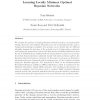Free Online Productivity Tools
i2Speak
i2Symbol
i2OCR
iTex2Img
iWeb2Print
iWeb2Shot
i2Type
iPdf2Split
iPdf2Merge
i2Bopomofo
i2Arabic
i2Style
i2Image
i2PDF
iLatex2Rtf
Sci2ools
121
click to vote
IJAR
2010
2010
Learning locally minimax optimal Bayesian networks
We consider the problem of learning Bayesian network models in a non-informative setting, where the only available information is a set of observational data, and no background knowledge is available. The problem can be divided into two different subtasks: learning the structure of the network (a set of independence relations), and learning the parameters of the model (that fix the probability distribution from the set of all distributions consistent with the chosen structure). There are not many theoretical frameworks that consistently handle both these problems together, the Bayesian framework being an exception. In this paper we propose an alternative, information-theoretic framework which sidesteps some of the technical problems facing the Bayesian approach. The framework is based on the minimax-optimal Normalized Maximum Likelihood (NML) distribution, which is motivated by the Minimum Description Length (MDL) principle. The resulting model selection criterion is consistent, and...
Related Content
| Added | 27 Jan 2011 |
| Updated | 27 Jan 2011 |
| Type | Journal |
| Year | 2010 |
| Where | IJAR |
| Authors | Tomi Silander, Teemu Roos, Petri Myllymäki |
Comments (0)

